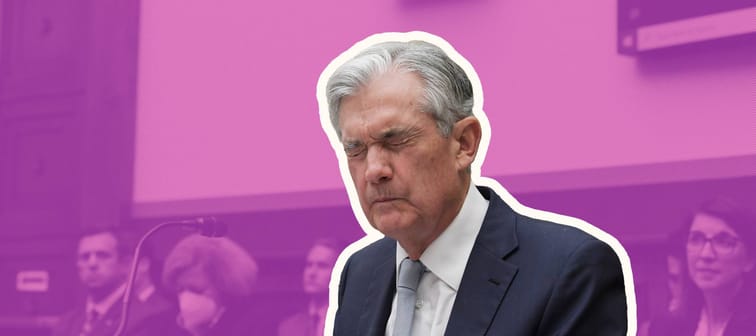Canada chooses a hawkish route
Normally, the Bank of Canada aims to keep inflation at a modest 2%, just like the Federal Reserve does.
So when Canada’s inflation rate hit 7.7% in May — its highest rate in nearly 40 years — it called for a much more aggressive response.
The central bank typically tinkers with its key policy rate in modest 0.25% increments, but Macklem announced July 13 that it would surge a full 1%.
That brings the Canadian overnight rate to 2.50%.
An increase of this size hasn’t happened since 1998. And while it’s going to have immediate implications for consumers, experts say it’s a necessary step for putting out the flames of inflation — even if it extinguishes Canada’s economy in the process.
Empower your investments with Qtrade
Discover Qtrade's award-winning platform and take control of your financial future. With user-friendly tools, expert insights, and low fees, investing has never been easier.
Start Trading TodayWhy Canada is being so aggressive
May's inflation figure was even higher than the central bank was anticipating, which means Macklem’s main concern right now is preventing high inflation from becoming entrenched.
It’s a difficult balance all central banks need to weigh. The Bank of Canada, like the Fed, chose to keep rates close to zero for the first two years of the pandemic to help boost the economy, but creeping inflation has forced them to act.
Typically, analysts would worry these supersized hikes could push the country into a recession.
Moshe Lander, an economist with Montreal's Concordia University, says a hike of this size is not only a “depressing move” but could also “take some of the starch out of the Canadian economy in the process.”
Although Lander has reservations about such a big hike, he can’t deny that inflation remains stubbornly high despite the bank’s efforts these last few months.
“And so [the bank has] no choice but to go nuclear and go with that depressing increase,” says Lander.
The risks of such a hawkish move are worth taking, writes the Bank of Montreal’s chief economist, Douglas Porter.
“Recession calls have become mainstream for the broader economy,” Porter wrote in a recent note to clients.
“But those rising risks simply cannot and will not sway the bank from soldiering on; the risk of recession has to be a secondary consideration to the reality of red-hot inflation.”
Canada and the U.S. move slowly compared to others
This is the Bank of Canada’s fourth interest rate increase in five months, and Macklem has already signaled it’s not done yet.
Many other countries outside of North America have been forced to take similarly aggressive steps.
In fact, the major criticism from Canadian economists has been that the Bank of Canada waited too long to pull out the big guns compared to other central bankers.
“All they have done today is to tiptoe into the neutral policy setting, when what Canada needs to counter inflation is something more deeply into restrictive territory,” TD economist James Orlando told the Financial Post.
“Front-loading would have been like what the (Reserve Bank of New Zealand) and (Bank of Korea) did when they began hiking last summer.”
The Reserve Bank of New Zealand announced its first interest rate hike in October of last year. And while the economy has started to show some signs of slowing, Governor Adrian Orr insists it was correct for the bank to move early and fast, saying it remains “resolute in its commitment” to bring down inflation.
Similarly, the Bank of Korea started raising rates in November 2021 and announced its sixth hike July 12, bringing the overnight rate to 2.50% there.
Unexpected vet bills don’t have to break the bank
Life with pets is unpredictable, but there are ways to prepare for the unexpected.
Fetch Insurance offers coverage for treatment of accidents, illnesses, prescriptions drugs, emergency care and more.
Plus, their optional wellness plan covers things like routine vet trips, grooming and training costs, if you want to give your pet the all-star treatment while you protect your bank account.
Get A QuoteHow might this affect the Fed’s next announcement?
If Canadian inflation is running as hot as a “four-alarm fire” — as BMO’s Porter so eloquently put it — then the U.S. is dealing with a five-alarm inferno.
On the same day as Macklem’s announcement, the U.S. Bureau of Labor Statistics released updated inflation figures for the month of May.
At a staggering 9.1%, U.S. inflation is at a 41-year high.
Although Powell announced a 0.75% increase in May — the largest bump in nearly 30 years — American economists have also criticized the bank for waiting too long to act.
Back in June, Powell said July’s announcement was likely to come down to a 0.50% or 0.75% increase, but the news from up North — along with the scorching-hot inflation numbers — may push him to act even more aggressively.
By Wednesday afternoon, investors were pricing in over a 75% chance of a 100 basis points hike in July, according to the CME Fedwatch tool.
With the Fed’s overnight rate now sitting at 1.75%, and plans to raise that to at least 3.4% by the end of the year, it’s all but certain there will be an increase announced later this month.
What’s less certain now is what that number will be.
Trade Smarter, Today
Build your own investment portfolio with the CIBC Investor's Edge online and mobile trading platform and enjoy low commissions. Get 100 free trades and $200 or more cash back until March 31, 2025.








